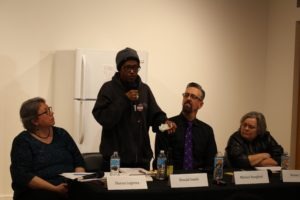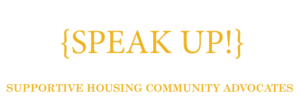
Ronald Smith, Speak Up participant, telling his story at a panel discussion on taking action to end homelessness on March 2017
Making my way into the back of a bar off of Damen into a very crowded room, I waited for Story Lab to start. I found out about this storytelling event while researching how to find storytellers for the advocacy program I coordinate called Speak Up. I was not quite sure what to expect and honestly was just nervous to try to recruit some of these storytellers to be volunteers for my program. However, I was quickly captured by the humor, frankness, joy, and sorrow these storytellers shared. Some of the stories were very personal and generally topics that people would hardly ever consider telling to a room of 20 plus strangers. Yet, as I listened to their descriptions of either silly, defining, or random events that occurred in their lives, I started to realize the mood of the audience change. I noticed pairs and groups chatting about the stories during intermission or approaching the storytellers to thank them after the show.
What I liked most about the event was how it created a space for listeners to understand issues or perspectives that they might never have considered before. It also served as a place to build community, and remember our shared humanity. After the event, I walked away thinking about how much we can learn from each other by just listening and allowing ourselves to be vulnerable. I went to many other shows after that, recruiting storytellers to volunteer as storytelling coaches, and each time became more excited about starting my program.
Just so you have a little background…Speak Up is a seventh-month program that helps current and former residents of supportive housing gain skills and knowledge to be effective advocates of supportive housing. A major part of the program is participants learning how to tell their story of their experience of homelessness and life before and after supportive housing. Participants work one on one with a storytelling coach outside of training sessions to develop their story and speaking skills to use for advocacy efforts.
 The reason this program was created is because my agency, CSH (Corporation for Supportive Housing), believes that storytelling is one of the most effective means of advocacy. Providing numbers or statistics on the benefits of supportive housing is important to understanding its impact on both individuals and communities in relation to other housing programs. However, sharing a story can be exponentially more influential. It helps establish a connection between the speaker and audience that allows for a deeper understanding. It makes whatever issue the storyteller is sharing to become more real and urgent as it takes the form in human flesh. It is no longer something skimmed over in a news article or an avoided conversation topic. The listener is now faced with determining how they think and feel about the story being shared and what actions to possibly take.
The reason this program was created is because my agency, CSH (Corporation for Supportive Housing), believes that storytelling is one of the most effective means of advocacy. Providing numbers or statistics on the benefits of supportive housing is important to understanding its impact on both individuals and communities in relation to other housing programs. However, sharing a story can be exponentially more influential. It helps establish a connection between the speaker and audience that allows for a deeper understanding. It makes whatever issue the storyteller is sharing to become more real and urgent as it takes the form in human flesh. It is no longer something skimmed over in a news article or an avoided conversation topic. The listener is now faced with determining how they think and feel about the story being shared and what actions to possibly take.
One of the greatest things I have taken away from my VISTA position so far is learning how to use storytelling for advocacy. It is an incredibly powerful tool that creates change from a place of connection and empathy. Whether that is changing one person’s perception of what it is like to experience homelessness, or influencing organizations or lawmakers to help support and create supportive, affordable housing as well as more opportunities for people to thrive in their own communities. The more time we take to listen to each other, the more informed we become about someone else’s experiences. The more informed we are, the more we are able to support each other from a place of awareness and understanding. Only then are we able to work collaboratively to address individual, community, and societal issues. And that can all start with a story.
— Ashlen Olmsted, AmeriCorps VISTA at CSH